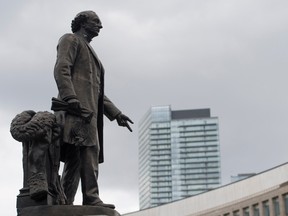Jamie Sarkonak: Parks Canada’s agenda to erode any pride for John A. Macdonald
The agency is increasingly dedicating itself to the airing of unresolvable historic grievances
Author of the article:
Published May 21, 2024 • 5 minute read
209 Comments

Article content
If you happen to be in Kingston, Ont. in the next several months, consider visiting the newly re-opened Bellevue House National Historic Site, John A. Macdonald’s historic home. With careful timing, you might be able to attend the hour-or-so “Unpacking Macdonald” tour about racism, sexism and the first prime minister’s political decisions.
“Bring an open mind and open heart and join the discussion in this safe space,” reads the tour description.
Article content
Article content
As diversity initiatives often are, this little tour is just one outcome of Parks Canada’s broader effort to integrate progressive identity politics into its mission. Nearly a decade of Liberal governance has made Canadian heritage a tool to reinforce contemporary multiculturalism, guided by careful demographic tallying augmented by subtle social commentary.
It goes back to at least 2019, when Parks Canada released a new system plan for history and commemoration. The framework set four priorities for the agency to address reconciliation and Canada’s changing demographics, among other things: Indigenous history, environmental history, diversity and “Canada and the world.” These replaced the priorities of the previous plan (Aboriginal history, women’s history and ethnocultural communities’ history) that had been in place since 2000. There is no priority, of course, for just … Canada.
Indeed, the Parks Canada belief seems to be that people are inherently narcissistic, unable to appreciate the past unless every story, every institution, mirrors the identities of today’s Canada.
This newsletter tackles hot topics with boldness, verve and wit. (Subscriber-exclusive edition on Fridays)
By 2020, then-environment minister John Wilkinson launched a series of consultations on how to move Parks Canada onward. The government’s summary of the consultations predictably focused on identity: those who aren’t able-bodied white males “frequently feel excluded from these places” and therefore more change was needed. Suggested solutions included subsidizing transportation to parks for low-income Canadians, valuing all world views equally and ensuring that employees demographically reflect the population.
In 2022, the Liberals moved towards demographically reflective park governance with the tabling of Bill C-23, the historic places of Canada act. The law, which remains in second reading and would replace the current Historic Sites and Monuments Act if passed, would add mandatory Indigenous seats to the Historic Sites and Monuments Board of Canada. Though, the board is currently diversity-quota-free and has Indigenous members already. The new law would also mandate that “Indigenous knowledge” inform decisions on historical designations — a bizarre affirmation by the government that ethno-epistemology should guide policy.
t
These changes to the law were specifically requested by the Truth and Reconciliation Commission, which, evidently, have been accepted uncritically by the government.
Following the new plans and bills, Parks Canada came out with a new values and ethics code in 2023 that also championed the cause of total diversity. It emphasized the importance of “Indigenous knowledge” once more, as well as the need to tell history in a “socially” responsible way. Unobjectionable on their face — responsible storytelling is always a good thing, and Indigenous input can certainly round out the stories of early Canada — but by invoking ethnicity-based knowledge and the social-justice-adjacent term “social responsibility,” the code takes on a political tone.
Later, on the Parks Canada ethics code outlines the organization’s commitments to diversity, equity and inclusion (DEI), it regurgitating the familiar list of prioritized groups:
“Being a successful and innovative agency is rooted in our ability to create inclusive spaces…. This also means providing fair and equitable access to opportunities for under-represented people including: Black, Indigenous, people of colour, the Two Spirit, lesbian, gay, bisexual, transgender, queer+ (2SLGBTQ+) community and people living with disabilities.”
It is a good thing to accurately depict history. But the outsized focus on small subsets of the population and the insistence to tell “socially responsible” stories that jive with today’s obsession with perfect ethnic representation in every institution is unlikely to accurately portray the past, as Canada was not as diverse back then as it is today.
In practice, Parks Canada has set a number of practical goals to achieve total diversity. According to its 2023 departmental plan, an in-the-works DEI strategy would pilot an employee sponsorship program for anyone who is not white, able-bodied and straight.
As far as the telling of history goes, Parks Canada’s transformation is best illustrated by its newest changes. The agency is currently reviewing 210 historical designations for colonial assumptions, problematic terminology, controversial beliefs and behaviours, and the absence of “a significant layer of history.” These sites, which often acknowledge historical figures of note, may have their plaques edited — or removed entirely. While editing might be in order for some, the prospect of removal is chilling.
An update to Parks Canada’s management plan for Anne of Green Gables-related sites on Prince Edward Island now seeks to “share more inclusive histories and seek to advance reconciliation” — even though the Indigenous presence on the island when Lucy Maud Montgomery lived was likely low.
And most recently, the agency animated its strategic priority of “diversity” at last weekend’s opening event for Bellevue House. Reporting from the function, Toronto Sun columnist Joe Warmington quoted Jarred Picher, a director at Parks Canada, telling the crowd that Macdonald’s “prime ministership has left deep harms that continue to be felt over 150 years later” — an ominous message to inspire shame in the nation’s founding.
Another speaker, Channon Oyeniran, a vice-president of the Ontario Black History Society with a very limited list of publications, told the Bellevue House crowd that Macdonald is remembered for his role in building the nation — but “he is also remembered for his harmful, discriminatory and exclusionary views and policies toward various racialized groups of people, including Indigenous Peoples, Chinese Canadians, Black Canadians and many more.” She claimed that Canada was “steeped in racism, colonialism, white supremacy and other legacies of enslavement.”
Another speaker, Amy Go, president of the Chinese Canadian National Council For Social Justice, claimed that racist occurrences towards Asian Canadians during the COVID-19 pandemic “can in many ways be traced back to the time when John A. Macdonald and other politicians of the day” because they had “portrayed Chinese as foreigners.”
Forget Macdonald’s architecting of the Canadian state, his vaccination and famine relief programs, his belief in law and order and the protection of Indigenous subjects from violent Americans to the south.
I haven’t taken the “Unpacking Macdonald” tour at Bellevue House; when I asked Parks Canada for details about its content Friday, a representative offered to simply provide me (or a local Postmedia reporter) the tour. So, being in Alberta and thus unable to capitalize on the invitation, I can’t rule out that Parks Canada includes nuanced and fair social context when recounting Macdonald’s life. However, given the agency’s big-picture plans, and the fact that the site’s opening was clouded by community representatives airing their unresolvable historic grievances, I suspect it’s unlikely.
Parks Canada wants to tell a story that demoralizes the nation by painting its founder as a Hitlerian figure; proper context wouldn’t allow for that.

